
foreword | Historical Narratives | Resources | Links | Contact
A MAN OF EXQUISITE CHARM
History is the intermittent appearance of commanding personalities.
But time shall fondly trace the name
Of Brock upon the scrolls of fame,
And those bright laurels which should wave
Upon the brow of one so brave,
Shall flourish vernal o'er his grave
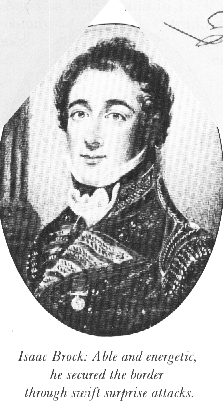 |
|
Sir Isaac Brock |
Brock was awakened that fateful morning by the cannons' call to duty and to death. His final day upon this earth was ushered in by a violent thunder storm, whose heavy rains soaked soil and soldiers - American invaders then paddling feverishly across the windswept waters of the Niagara River.
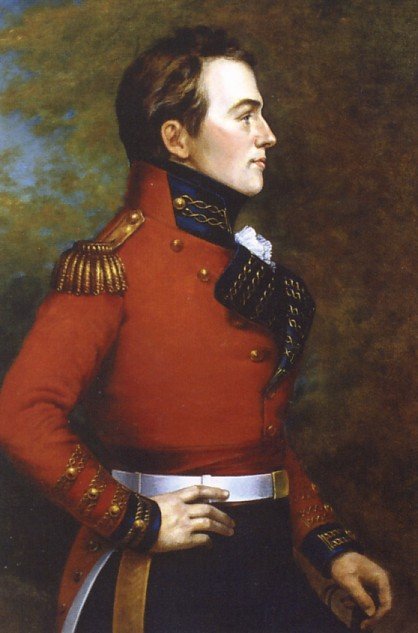 |
|
Isaac Brock |
October 13th, a day to become of tremendous significance in Canadian history, was a blustery, rainy day. In the early early morning darkness, American troops commenced crossing the Niagara River intent on taking tiny Queenston in their quest to take Canada. A militiaman spotted them and raised the alarm. The Grenadier company of the 49th, Brock's own regiment, commenced firing on them with two little 'grasshopper' cannons with good effect. The officer in charge was wounded along with a number of the rank and file before they got far from the river bank.
A small detachment was able to land further up the shore at an unguarded trail known locally as the, Fishermen's Path. They scrambled up the steep, slippery slopes of the treacherous cliff around five o'clock, reached the summit unchallenged and moved towards the crest of the hill. According to John Glegg, one of Brock's military aides-de-camp, no sentry had been posted at the top of the Fisherman's Path because it was thought to be so steep and narrow that,
In His Own Words
"The devil himself could not get up there."
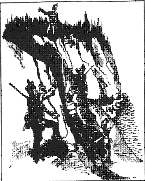 |
|
Fisherman's Path |
Faithful to his family's motto He Who Guards Never Sleeps, Brock at Fort George worked into the early morning hours on dispatches calling out the militia for he knew the attack was imminent. He wrote also what was to be his last letter to his brother in England, then retired with his uniform on. Shortly thereafter he was awakened by the sound of distant cannon fire. The attack had begun. He immediately ordered Sheaffe to begin the bombardment of Fort Niagara. Brock was not entirely sure where the major American assault would be concentrated, so he told Sheaffe to keep alert for possible landings at Fort George and he would send word for reinforcements if he found the situation at Queenston required them.
Mounting his horse Alfred, Brock galloped off along the road to Queenston as the chill, damp day dawned. The muddy road was rutted with puddles from the heavy rains that fallen the night before. Brock wore a tall, cocked hat and as he rode a long, black cloak billowed out behind him revealing flashes of the scarlet tunic of the 49th Regiment. As he galloped the 20 kilometres southward to the site of the American invasion he shouted to militiamen he met along the way urging them to arms and to action with the words, "Push on York volunteers."
Legend has it that as Isaac Brock rode into battle that decisive day, he made one brief stop at the residence of Captain John Powell to see Sophia Shaw, the daughter of Major-General Aeneas Shaw. Sophia served him a 'stirrup cup' of coffee then he bade her a fond farewell and thundered off into the morning mist. From the porch Sophia waved her lace handkerchief at the man about to become a myth. Sophia survived Isaac by many years. No mention is made of their relationship in any of Brock's correspondence although Mrs. Ridout, a grand-daughter of Chief Justice Powell, heard in her youth the story of Sophia's romantic link with the man who became a legend.[*]
Covered with mud Brock rode into Queenston, his arrival greeted with a loud and hearty cheer from his men. He spurred forward up to the single 18-pounder on the edge of the crest overlooking the river in order to get a good overview of situation on the other side. The heights seemed safe. Noting as as he watched the shelling of the opposite shore that the shells from the 18-pounder commanding a portion of the river were bursting prematurely, he turned to order the use a longer fuse. As he did so, he became aware of the fact that some of the foe had gained the heights. Since resistance was impossible in this exposed position, Brock ordered their cannon spiked, then he and the small party quickly descended the hillside where he reformed his troops. After sending word to Sheaffe to bring up all the troops that could be spared, Brock rallied some men to recapture the cannon.
Impetuous, bold, some even called him rash, Brock rarely failed to act with daring dispatch. Undaunted by doubt or danger, he was determined to recover the cannon the Americans had seized and to drive them back across the river. "In the presence of their gallant chief the troops were seized with fresh spirit and spurred to renewed exertion to retake the position." With drawn sword Brock led a party of fifty on foot in a counter-attack. He never appeared bigger nor more conspicuous than he did that morning as he scaled the escarpment. Shouting to rally those around him, Brock ascended the slippery slope a few paces in advance of the line.
.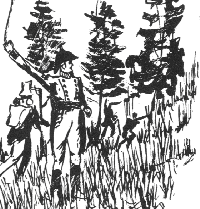 |
|
Charge! |
Brock's presence and prominence made him an easy target. While unmindful of enemy fire, he was not impervious to it. An American sharpshooter named Robert Walcot claimed to have killed him. "I went to the edge of the line and taking careful aim fired at Brock." At a range of thirty yards he felled him with a bullet to the chest just above the heart. A young lieutenant named Benjamin Jarvis hastened to his side and asked anxiously, "Are you much hurt, sir?" Brock never replied. Too prodigal of that life so needed by the province he defended, Brock died instantly. He was carried off the battlefield and for the remainder of the day his body rested in Queenston village.
 |
|
Lost Leadership |
Patriotic history is about heroes. "Between a people and its heroes there is an intimate sympathy" and Brock's death at that climactic moment enshrined his name forever in the hearts and minds of Canadians. "Brock's death at Queenston Heights invested his heroism with the character of sacrifice. From the first he was called the saviour of Upper Canada." Brock was a name to conjure with, like those in the list of his forerunners - Champlain, Frontenac, Carleton, Wolfe and Montcalm
Brock is one of those fascinatiing figures upon whom a period of history pivots. Seen through the telescope of time, he and the period in which he fought fitted together like sword and sheath. No name is better preserved in Canadian history, it has become a household word to each succeeding generation.
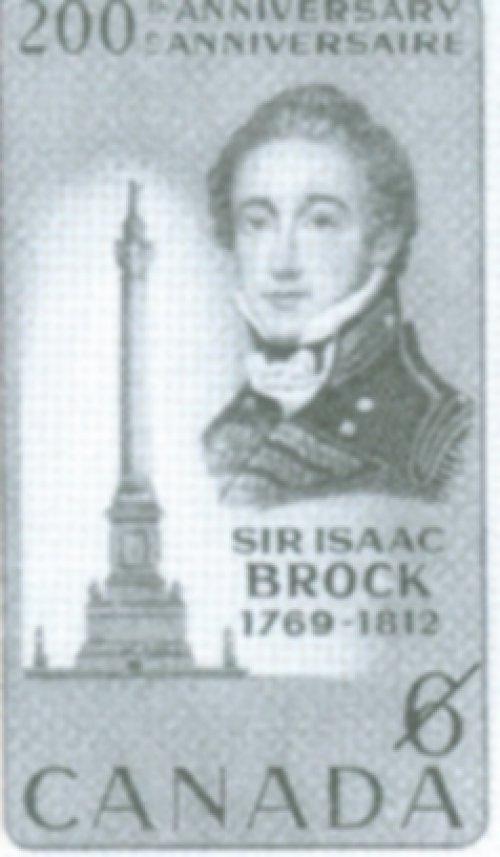 |
|
Sir Isaac Brock 1769-1812 |
A man of chivalrous honour and unfaltering gallantry, Brock remained undismayed in the most threatening of circumstances. "Radiate confidence, That’s the first duty of a top commander." Field Marshal Bernard Montgomery's words to his officers were followed to the tee by Isaac.Brock, who lost his life revelling in that role. When duty and danger beckoned, he like humblest soldier in the ranks was unfailingly front and centre in any fight Little wonder he was loved by the men he led. Tragically, given his importance at that tense time for Canada, he would have been better advised to beware bravado acts in order to provide the colony's longed-for leadership.
"If he spared not others, he never spared himself. While he was gentle, considerate, kind and sympathetic with men of all ranks and in all circumstances, no commander ever showed more firmness in the maintenance of discipline and order. It is not an exaggeration to say that even to this day in Canada, there are those who cannot pronounce his name without a tremor of suppressed emotion."
Brock brought the mind of a statesman to every enterprise in which he was engaged. By his conduct he set the bright example for others to follow. In Brock we had a commander worthy of many regiments. A man of lore and legend, he was an authentic hero who embellished and inspired the Canadian chronicle.
What of Brock the boy and man? Isaac was born on October 6th, 1769. This was an auspicious year for it saw as well the birth of Napoleon Bonaparte and the Duke of Wellington, men destined to change the face of Europe. Brock shared a similar fate for he determined the destiny of Canada.
Nestled between Normandy and Brittany are nine tiny spots in the sea known as the Channel Islands. The main ones are Guernsey, Jersey, Alderney and Sark. Totalling 75 square miles of fields, forests, cliffs and soft climate, Guernsey is the second largest island, some twenty-five miles square, shaped like a right-angle triangle and has a population of some 60,000 people. While Guernsay is independent and lies just off France, whose coast can be seen on a clear day, it owes its loyalty to the British Crown. The Normans annexed it in the tenth century and after the conquest, William the Conqueror attached it to the English crown and English it has remained. It is a fair, fine little place abounding in beautiful scenery with many wonderful walks that provide thrilling outlooks on its lovely green hills and craggy coastline. St, Peter Port on the side of a hill in the middle of the sheltered eastern coast is the largest city, the only town of any size and the island's capital.
 |
|
Guernsey |
 |
|
Guernsey |
 |
|
Guernsey's Castle Cornet was built as an English stronghold to help to protect the Island’s safe anchorage at St Peter Port |
Castle Cornet is Guernsey's ancient harbour fortress built around 1250 on an rocky islet off St Peter Port to defend the island against the French, It has been wonderfully preserved and remains as a living monument to centuries of tradition. During the occupation by the Germans in the Second World War, it became a strong point with the addition of concrete shelters and anti-aircraft guns.
 |
|
Castle Cornet |
A bronze ‘Falcon’ cannon in one of the museums illustrates early artillery defence. Made in the 16th century this cannon had a maximum range of some 1300 paces with a full charge of 2.5 pounds of gunpowder.
 |
|
Canon |
Castle Cornet was superceded as the island's principal defence fort, by one whose name, ironically, is Fort George, which was completed in 1812 shortly after the outbreak of the French Revolution.
 |
|
Fort George |
Isaac Brock's birthplace in Guernsey was a granite house in the centre of St. Peter Port.
 |
|
View of St. Peter Port from fort George |
He was born into the moderately wealthy family of John Brock and Elizabeth de Lisle. Elizabeth's father was lieutenant-bailiff of Guernsey, a position comparable to Upper Canada's lieutenant-governor, the self-same post her son, Isaac, was to occupy. The couple had 14 children, 10 sons and 4 daughters, 10 of whom lived to maturity. Isaac was the eighth son.
Brock loved the out-of-doors and the island offered no end of wonderful woody haunts where he hunted, fished and fought. The active youngster was always eager to compete and was rarely bested in tests of strength and endurance. He excelled in the athletic activities and was a good runner, boxer and swimmer. A skilled and fearless horseman, Brock loved the challenge of the chase and thrilled to the risks he ran as he raced about the island.
 |
Isaac was tall, 6 feet two, with auburn-coloured hair and sharp, rather small, piercing blue eyes and a fair and florid complexion with a large forehead and full face though without prominent features. His mouth was small with fine teeth, and when he smiled, the expression was particularly pleasing. Later in life he was described as being stout, even inclined to corpulency, a big, blunt, handsome man who by his own admission was fit and "hard as nails." While strong and forceful he was also kind and gentle and was best remembered by his family as a caring, considerate person. To his friends he was a high-spirited, good-natured individual who combined courage and daring boldness with foresight and imagination. In manner he was exceedingly affable and gentleman-like, of a cheerful and social habit, enjoyed dancing and though he never married he was extremely partial to female society. Accused once of placing himself at risk unnecessarily, he responded that he never sent another where he was not prepared to go himself. He inspired remarkable loyalty, even love in those he led for despite his rank and reputation, he remained to the end a modest, unassuming person who shunned pomp and show.
Isaac attended school in Guernsey and in Southhampton, England and studied for a year in Rotterdam, where he learned to speak French. He recognized the defects in his education and in later life attempted to rectify them by devoting much of his leisure time to reading and study, becoming to a some extent a self-educated man. He shared his eagerness for education with the soldiers, and loaned out his library to those who wished to read. He encouraged and assisted those who aspired to educate and improve themselves.
The Brock family fed the armed forces. Military life attracted a number of Brock boys, all following in the footsteps of their father, John Brock, a vigorous, capable individual who was a midshipman in the Royal navy. He died at the age of forty-eight at Dinan in Brittany, France. Among the Brock children who survived to adulthood, John, the eldest, became a lieutenant-colonel in the 8th or King's Regiment. He lost his life in a duel in 1801 at the Cape of Good Hope. Ferdinand, was a lieutenant in the 60th or Royal American Regiment and saw distinguished service in the American Revolution. He was killed at the Battle of Baton Rouge. Savery, [**] the sibling most like Isaac in character and appearance, was a mid-shipman in the navy. Later he joined the army and served in the Peninsular War as aide-de-camp to Sir John Moore, a position of importance and prestige. Daniel de Lisle Brock achieved success as chief magistrate in Guernsey, William became a merchant and Irving a clever translator and writer. While all eight brothers reached maturity, they left no male descendants. Two sisters, Mary and Elizabeth, survived to adulthood. The latter married John Tupper and several of their sons died for King and country.
Brock purchased an ensigncy in the 8th Regiment of Foot on the 2nd of March, 1785 at the age of fifteen. In 1791 he joined the 49th Regiment with the rank of captain and remained with the regiment for the rest of his life. He served in Barbados and Jamaica where he became ill with a fever that killed a cousin who had accompanied him to Jamaica. Isaac might have died too had it not been for his faithful servant, Dobson, who nursed him back to health in the healing salt breezes of his island home.
Drawn to the the military by more than the surface glare, glory and blaze of an officer's scarlet and gold, Brock was one of those rare individuals fashioned for heroics. He was superbly confident and utterly fearless. While serving in the West Indies, Isaac, a subaltern of twenty-one, was challenged to a duel by a captain, a smaller person but with a big reputation as a bully because he was a crack duelist and a dead-shot at twelve paces. He had already gunned down several men who had faced him in a duel. Brock presented a large target and he decided to reduce the odds. As the one challenged, Brock had the right to name the conditions under which the duel would take place. He withdrew a handkerchief from his pocket and coolly proposed that they each hold a corner and fight their duel across its width. The captain blanched and blustered that in such a duel both men would die. Brock smiled and cocked his gun. Much to Brock's relief, his opponent, fearing the finality of the outcome, withdrew from the duel and subsequently from the regiment.
Following his recovery from the fever, Isaac served several years in England where he purchased a majority and worked as a recruiter. On October 25th, 1797 at the age of 28, Brock purchased a commission as lieutenant-colonel and shortly thereafter became senior lieutenant-colonel of the 49th Regiment. Because of his predecessor's negligence and mismanagement the regiment was in a disorderly and undisciplined state. Its restoration required a firm hand, a task to which Brock eagerly addressed himself. While he always demanded and got strict discipline, he was unfailingly considerate of his men, and interested in every aspect of their lives. Compassion was no less marked in him than courage and no complaint was too small to merit investigation and action. His soldiers' health and happiness were his concern and he made every effort to ensure that barrack's life was as comfortable as it was possible to make it. He was praised by the Duke of York for raising the regiment from one of the worst to one of the best in England.
In 1799 on the 12th of October - a significant date for Brock - the 49th fought with distinction at the Battle of Egmont op Zee in North Holland where they defeated the French and forced their withdrawal. During the battle Brock was struck in the neck by a spent ball which failed to penetrate the coarse, cotton handkerchief covering his thick, black, silk cravat. The impact of the blow knocked him from his horse but in the words of one historian, "his life was saved wondrously." In describing the incident to his brother John, Isaac said
In His Own Words "I got knocked down shortly after the enemy began to retreat but never quitted the field and returned to my duty in less than half an hour."In 1801 Brock and the 49th accompanied Lord Horatio Nelson in the naval attack on the Danish fleet at Copenhagen. Brock sailed in the ship Ganges, but he visited Nelson's flagship Elephant. While doubtless Brock saw Nelson, it would be interesting to know if the two men, who share kindred columns. ever met formally. Both men aree memorialized by stately shafts that express the eternal thanks of the nations they served so well. Nelson's column is located in London's Trafalgar Square; Brock's adorns the Heights of Queenston.
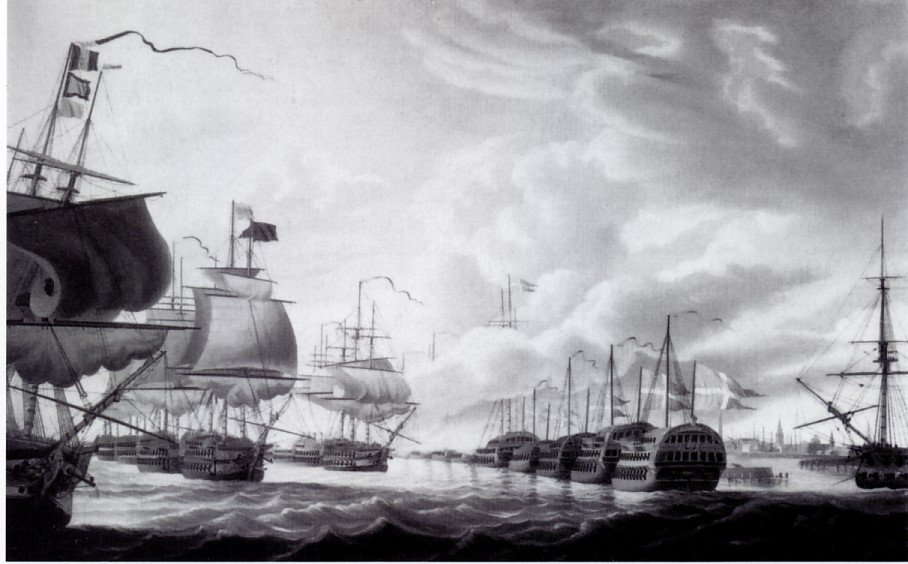 |
|
Battle of Copenhagen 2nd April 1801 [Fighting Ships] |
 |
|
Ships of the line at Battle of Copenhagen It was here Nelson put the telescope to his blind eye to ignore the signal to withdraw. |
Brock's next posting was at Quebec City where he and his regiment arrived in August, 1802. With the exception of his leave in England from October 1805 to June 1806, Brock was to spend the remainder of his life in the land linked by history with his name. The times destined him for fame.
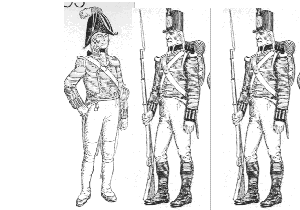 |
|
Officer and Privates of the 49th Regiment |
An energetic, able, highly professional officer, Brock was an exceptionally candid, pleasant personality who gave life to the dreary task of defending Canada. He motivated the men who responded to his call, giving spirit and fortitude to those fighting in the field. He endeared himself to those he led for he believed in the field, their fate should be his. This in the minds of some meant he lacked prudence, In May 1803 two companies of the 49th Regiment under Lieutenant Colonel Brock's command were posted to York to replace the 41st Regiment. Some of the soldiers were quartered in the Block House located at the east end of the town. The remainder were quartered at what was called the Garrison, a number of log huts on both sides of Garrison Creek not far from the present site of Fort York. The Block House was not a suitable location because it was too close to the Don River marshes. In July Brock noted that that a number of the Grenadiers were "falling ill of the Ague and Fever," while men located at the Garrison "continued in perfect health." Brock acted quickly and quartered all the men at the Garrison, "although I am perfectly aware that they will find but sorry accommodations."
A smaller detachment of the 49th Regiment was garrisoned at Fort George under the command of junior Lieutenant-Colonel Roger Hale Sheaffe
. [*] The following information was forwarded to me by Mr. Donald M. Jackson, whose 3rd Great-grandfather was Major General Aeneas Shaw. Mr. Jackson said they were always very proud to declare that,"This story of Sophia is quite the legend in our family history."
"Sophia Shaw, a daughter of Major General Hon. Aeneas Shaw, was born about 1792.
She is said to have met General Brock when he visited the Shaw home at Oak Hill, York (Toronto) in 1811 when she was 19 and he was 42. Sophia's mother was dead and Sophia had grown up in the care of her older sisters. In 1812 she went to stay with her sister Isabella who was married to John Powell, son of Chief Justice Powell. They lived in a new home between Fort George and Queenston. As a result she was near Fort George where General Brock (her fiancee) had his headquarters. General Brock is said to have stopped at this house on his way to Queenston from Fort George on that fateful day. Sophia gave him a stirrup cup of coffee. He is said to have promised to return but was killed at Queenston Heights. In 1813 Sophia returned to York to live with her sister Charlotte. When John Powell died in 1825, Sophia and Charlotte went to live with Isabella. In 1829 Sophia was back in Toronto living with her younger sister Anne, the widow of John Spread Baldwin and mother of Maurice Scollard Baldwin, later Bishop of Huron. In 1831 at 39 Sophia married James Ruggles on November 10. They had no children and she was widowed in 1865. She died on Dec 1, 1872 in her 81st year and was buried at the Necropolis on the banks of the Don river in Toronto. Charlotte married Ephriam Evans, a Methodist minister and had 4 daughters and 1 son. Charlotte pre-deceased her husband."
Savery Brock married Elizabeth de Jersey
Betsey de Jersey m. John Carey >
Minna Carey m.Colonel James Pirie >
Irene Pirie m. Edward Phillipsp-Turner >
Rollana Phillips-Turner m. Jean >
Sally Phillips-Turner m. Alan Greenaway
 |
|
Sally Greenaway LIVING HISTORY Sally is a direct descendant of Isaac's brother, Savery Brock, who is Sally's 3rd Great-grandfather. Sir Isaac Brock was Sally's 4th Great Uncle. |
Copyright © 2009 W. R. Wilson